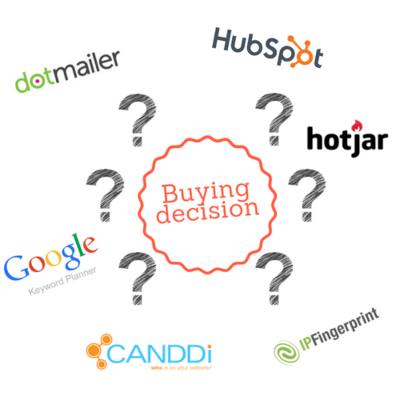Blog and News > tips > Buyer's Guide To Web Analytics
Buyer's Guide To Web Analytics
Today’s market is saturated with multitudes of tools that can help you track your website. How do you make the right decision when they all look kind of the same or seem to be doing the same thing? Look no further. I've put together a quick guide to help you in the struggle.

All the tools out there are trying to market their USPs to impress potential prospects. But at the end of the day, it’s hard to keep track of all the differences, purposes for which particular tools can be used and such. And just the sheer number and monotony of the products makes it hard for a business to decide what it is that they need.
Fear not. Here in CANDDi, I’ve done the research for you and put together a buyer’s guide to website analytics tools. I’ve grouped them into two main categories based on the department that would use the tool - marketing or sales. Then added sub-categories based on the need of each department. Keep in mind that I will only be focusing on tools that tie back to tracking the traffic on the website. Tools for customer research, influencer finder, and such are not covered in this guide.
####Marketing Focus The marketing department is usually looking to track how effective their campaigns are, how much traffic they all bring in, what’s the website performance, website optimization, etc. This data is to help them optimize the customer’s journey and experience on the website. As a result, they are trying to drive higher enquiries and consequently conversion in the business. Here is a non-exhaustive list of some of the main kinds of tools marketers might be interested looking into.
Social media managing and tracking tools - This tool helps to automate and to schedule posts on social media. Some of them can also track interactions with the posts and reactions to them; Hootsuite, Meet Edgar,…
Heatmaps - Heatmaps track the mouse movement across the page to see where people hover the most, where they click through to. This tool helps to optimize the website. For example, if you have a “subscribe” button on your page and you see little activity over it, you can then move the button to where most of the mouse movement congregates; Hotjar, Crazy Egg,…
SEO analytics - Understanding the most used search terms that people use to visit your website is useful to decide your content, drive more people to website, appear higher on Google search; Google Keyword Planner, RankRanger,…
Web traffic tracking - We are talking more aggregate data in this case. Numbers of page hits, demographic, geographic data. Also, in some instances, it includes tracking which campaigns are working; Google Analytics
Marketing automation - This one is your usual email marketing platform and it will track your bulk emails. It will show you the open and click-through rate. You can then create drip campaigns, more target campaigns, etc.; DotMailer, Forfront, Mailchimp,…####Sales Focus Pure sales focused tools are less common. What is measured for salespeople is generally the number of sales they make in a month/quarter. However, there are tools out there designed to help salespeople hit that target. You probably know them as lead generation tools. Here they are separated based on the level of information they provide.
Company data tracking - A tool like this gives you the name of the business that has been on the website. Sometimes it can give you a list of key contacts but that doesn’t guarantee they have been on your website. They are useful, but generally, sales people are then left to find out the right person on their own; A1WebStats, IPFingerprint, Lead Forensics…
Individual data tracking - This is often confused with marketing automation. There are tools out there that do not work as a marketing automation tools (ie you do not send your bulk emails through them). However, they are designed to plug into the marketing automation platform. By doing that, the data you might already have will be enhanced (ie understanding prospect’s activity on the website after email marketing click-through). Individual data tracking is able to drill down to the name and contact details of the actual person that visited your website; CANDDi,…
In order to make sure that you are making the right decision, there are a few things that you need to establish first. Do you want to track your marketing activity and efficiency; or do you want information that helps your sales team close more business? After you answer that, drill down to what particular metric you want to be tracked, or what should it be used for. Having established that along with this guide, you should be able to figure out which particular tool your business needs.